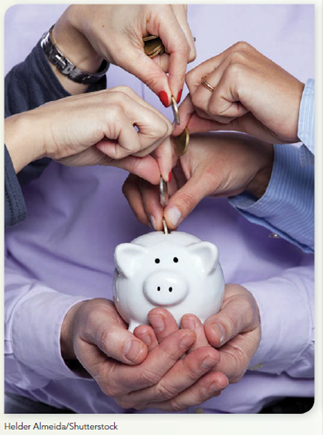
Management 13th Edition by John Schermerhorn,Daniel Bachrach
Edition 13ISBN: 978-1118841518
Management 13th Edition by John Schermerhorn,Daniel Bachrach
Edition 13ISBN: 978-1118841518 Exercise 20
THINK BEFORE YOU ACT
Fifteen members of a work team are asked to distribute a pool of 1,200 stock options as annual bonuses to one another.
Teammates Know You, But Should They Pay You

T raditionally, managers or team leaders made final pay raise decisions. But times may be changing in an increasingly crowdsourcing world. Your pay may now be decided by your teammates, not your boss.
Picture this. Fifteen members of a work team log into to an online exchange run by their employer. Their task is to distribute a pool of 1,200 stock options as an annual bonus to their teammates. The only rule is that they can't give any to themselves. Each person's final bonus options are the sum of what other team members give them. When the exchange closes each individual gets notified of their bonus awards and the distribution of bonuses awarded in the team-no names attached.
The example is real. It comes from a San Francisco start-up called Coffee Power. The pay practice was initiated by entrepreneur and co-founder Philip Rosedale. The idea is that because teammates know one another best, they also know who deserves to be recognized at bonus time.
Those in favor of the practice might say that by giving the bonus decision to the team, it empowers members who get to invest in and reward one another for their performance and contributions. One Coffee Power employee says the approach "lets me reward people that management may not always recognize." Those against the practice might say it's a bit like having students give each other grades on a team project. There's too much room for results to be manipulated according to friendships and perceived "need." Too often, performance falls by the wayside as an award criterion in favor of less relevant, nonperformance factors.
YOUR TAKE
At this point, you've surely done peer evaluations in teams and perhaps even assigned grades to team members. What's your take on the Coffee Power approach to bonuses Does this use of technology really dig down to the level of truly rewarding individual contributions to team performance Or, is it a practice that potentially introduces more problems than it is worth
Fifteen members of a work team are asked to distribute a pool of 1,200 stock options as annual bonuses to one another.
Teammates Know You, But Should They Pay You

T raditionally, managers or team leaders made final pay raise decisions. But times may be changing in an increasingly crowdsourcing world. Your pay may now be decided by your teammates, not your boss.
Picture this. Fifteen members of a work team log into to an online exchange run by their employer. Their task is to distribute a pool of 1,200 stock options as an annual bonus to their teammates. The only rule is that they can't give any to themselves. Each person's final bonus options are the sum of what other team members give them. When the exchange closes each individual gets notified of their bonus awards and the distribution of bonuses awarded in the team-no names attached.
The example is real. It comes from a San Francisco start-up called Coffee Power. The pay practice was initiated by entrepreneur and co-founder Philip Rosedale. The idea is that because teammates know one another best, they also know who deserves to be recognized at bonus time.
Those in favor of the practice might say that by giving the bonus decision to the team, it empowers members who get to invest in and reward one another for their performance and contributions. One Coffee Power employee says the approach "lets me reward people that management may not always recognize." Those against the practice might say it's a bit like having students give each other grades on a team project. There's too much room for results to be manipulated according to friendships and perceived "need." Too often, performance falls by the wayside as an award criterion in favor of less relevant, nonperformance factors.
YOUR TAKE
At this point, you've surely done peer evaluations in teams and perhaps even assigned grades to team members. What's your take on the Coffee Power approach to bonuses Does this use of technology really dig down to the level of truly rewarding individual contributions to team performance Or, is it a practice that potentially introduces more problems than it is worth
Explanation
A start-up named C P designed a new form...
Management 13th Edition by John Schermerhorn,Daniel Bachrach
Why don’t you like this exercise?
Other Minimum 8 character and maximum 255 character
Character 255


